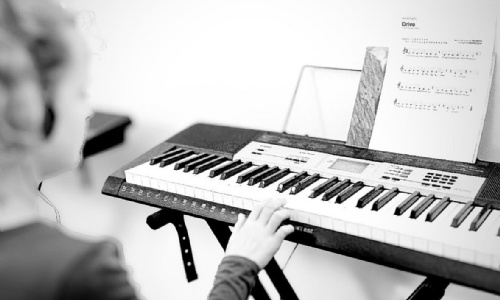Exploring New Sounds: Bringing More Music to Our SEND Support Centre

Music has always held a special place in education, and in a SEND setting. While music is often celebrated in mainstream schools for its ability to inspire creativity, build confidence, and bring joy, in a specialised setting it also becomes a powerful tool for communication, emotional expression, and sensory regulation. For children who may face barriers with language or social interaction, music offers an alternative pathway to express themselves and connect with others in a way that feels natural, safe and rewarding.
This week brought a particularly exciting moment in our SEND Support Centre: the arrival of a brand-new set of keyboards, stands, headphones and stools. From the moment the boxes were opened, the atmosphere was filled with curiosity and anticipation. The children themselves played a big part in helping to assemble the equipment, an activity that sparked teamwork, problem-solving and a sense of ownership. By the time the last stool was set in place, the pride on their faces was clear - they weren’t just preparing instruments, they were preparing to step into a new world of musical exploration.
Now that the keyboards are in use, music has quickly become part of daily life in the centre. Structured sessions give the children the chance to follow guidance, learn rhythms, and explore melody, while the freedom to experiment allows them to discover sounds in their own way. The addition of headphones has been especially valuable, giving each child the chance to focus and immerse themselves without distraction. For some, that quiet bubble brings comfort and concentration; for others, it becomes a safe space to be bold and creative.
What makes music so powerful in this setting is that it isn’t just about learning to play an instrument. It’s about building confidence, fostering independence, and creating moments of joy and connection. Music helps develop concentration, fine motor skills, and coordination, just as it does in mainstream education, but here it also becomes a therapeutic and inclusive medium. A child tapping out a steady rhythm is not only learning about timing - they’re regulating their body and mind. A child experimenting with melodies isn’t just pressing keys - they’re telling their own story, in their own way.
One of the fascinating things about introducing music into our SEND Support Centre has been seeing not just the joy it brings, but also the challenges it presents - and how the children are rising to meet them. Learning music is never an instant process; it’s about building skills step by step, developing patience, and understanding that progress comes with practice over time. For many of our children, this idea of working gradually towards a goal can feel daunting at first. They’re often used to immediate results in play or creative expression, so adjusting to the slower, more sequential nature of learning an instrument is a big shift.
There are also moments of frustration, and that’s an important part of the journey. Every musician - whether a beginner or an experienced performer - knows the feeling of hitting the wrong note, losing rhythm, or struggling with a piece that just won’t sound right. Those moments can be heightened, and it takes resilience and encouragement to work through them. But what has been remarkable is how the children are beginning to understand that mistakes are not failures; they are part of the process.
I look forward to documenting this specific journey as the children continue to adapt to the challenges, and celebrate the enjoyment and musical aptitude the children make over the coming year.
The impact is already presenting itself: our Support Centre children are engaging daily, not just as learners, but as musicians in their own right. The new keyboards and accompanying music lessons are more than just instruments; they are gateways to expression, confidence, and creativity. In a SEND setting, that opportunity is priceless, and it reminds us that music truly does belong to everyone.
